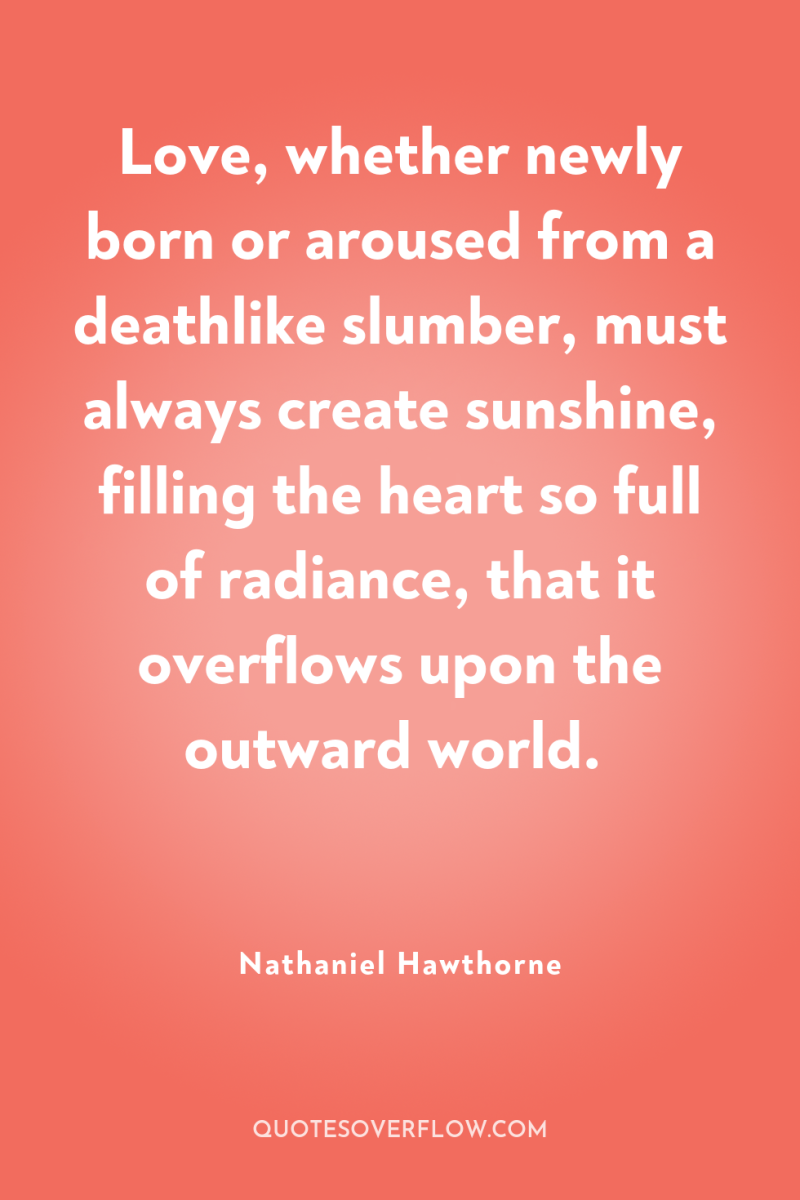
1
Love, whether newly born or aroused from a deathlike slumber, must always create sunshine, filling the heart so full of radiance, that it overflows upon the outward world.Nathaniel Hawthorne
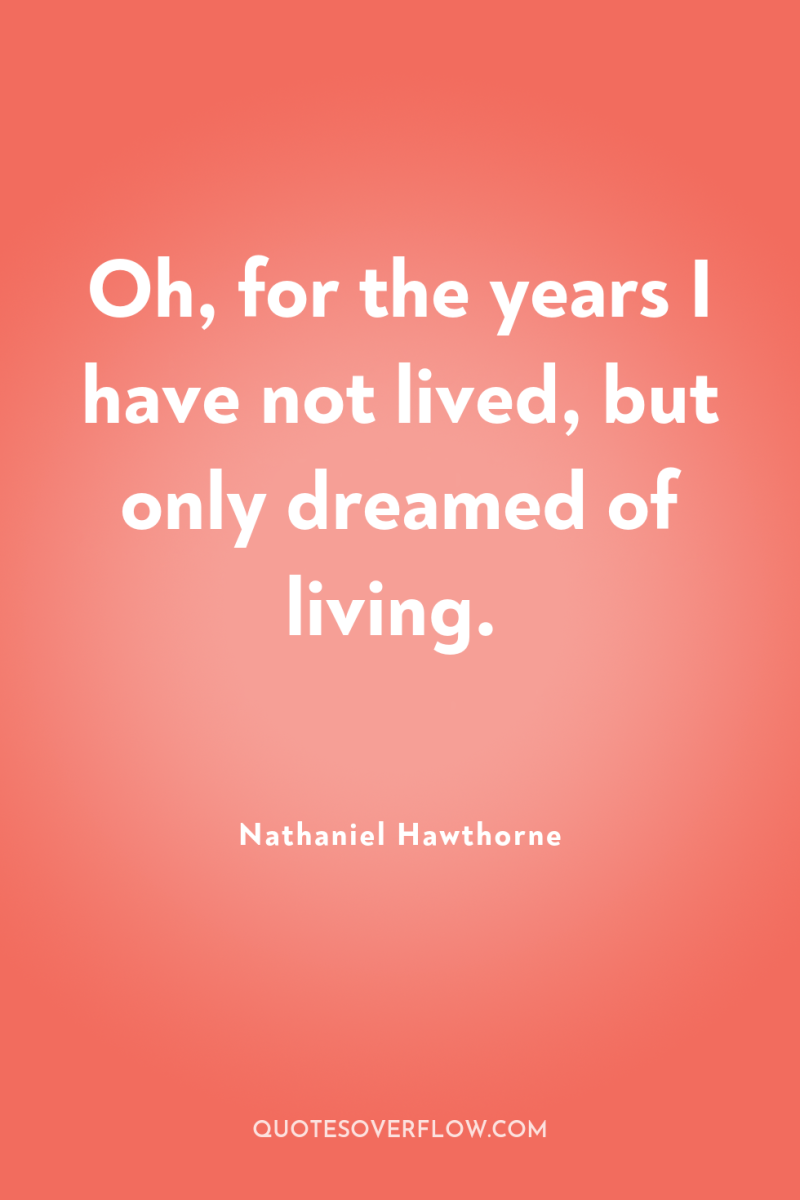
2
Oh, for the years I have not lived, but only dreamed of living.Nathaniel Hawthorne
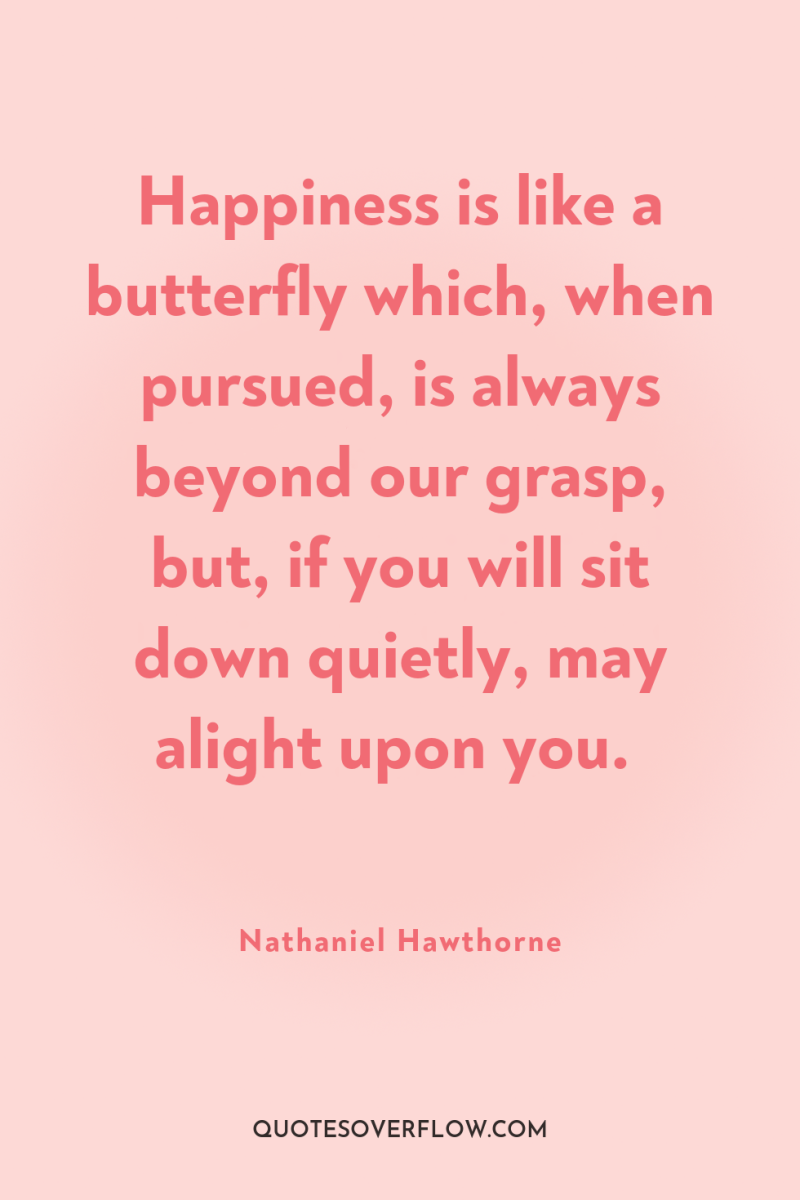
3
Happiness is like a butterfly which, when pursued, is always beyond our grasp, but, if you will sit down quietly, may alight upon you.Nathaniel Hawthorne

4
Every individual has a place to fill in the world and is important in some respect, whether he chooses to be so or not.Nathaniel Hawthorne
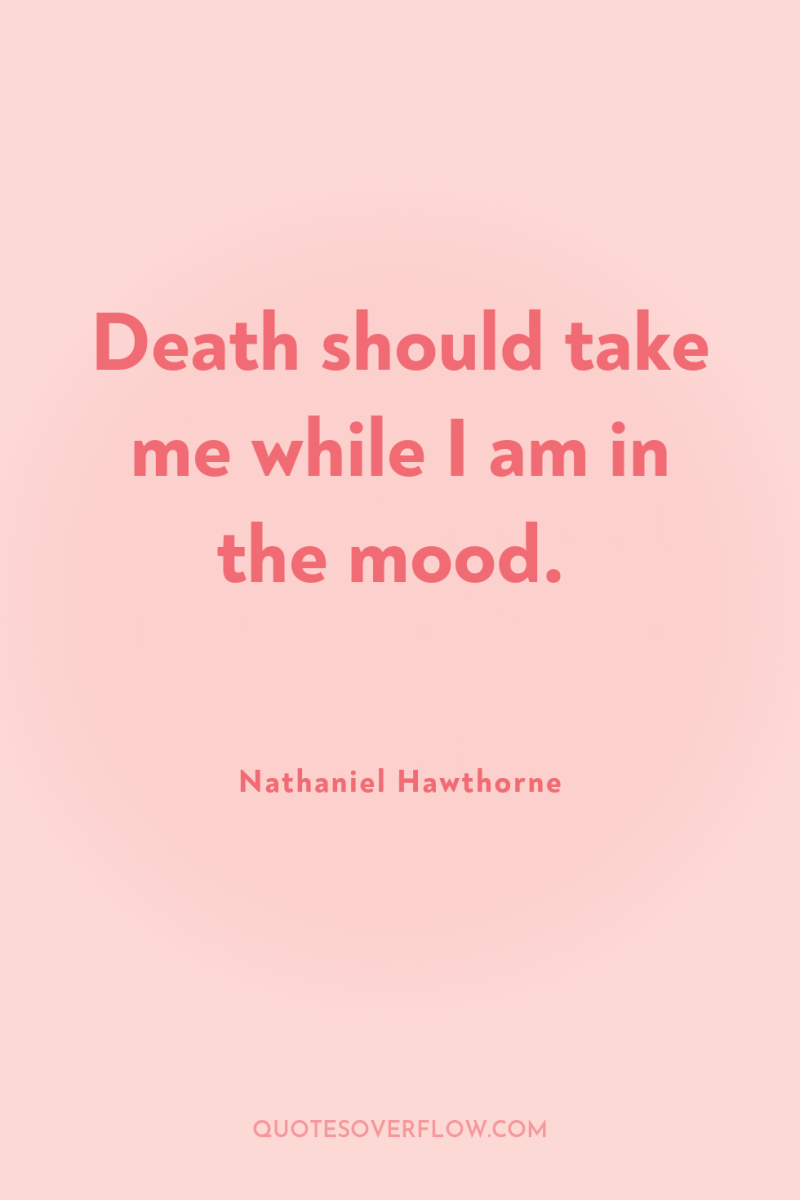
5
Death should take me while I am in the mood.Nathaniel Hawthorne
6
When an uninstructed multitude attempts to see with its eyes, it is exceedingly apt to be deceived. When, however, it forms its judgment, as it usually does, on the intuitions of its great and warm heart, the conclusions thus attained are often so profound and so unerring as to possess the character of truth supernaturally revealed.Nathaniel Hawthorne
7
There can be, if I forebode aright, no power, short of the Divine mercy, to disclose, whether by uttered words, or by type or emblem, the secrets that may be buried with a human heart. The heart, making itself guilty of such secrets, must perforce hold them, until the day when all hidden things shall be revealed. Nor have I so read or interpreted the Holy Writ, as to understand that the disclosure of human thoughts and deeds, then to be made, is intended as part of the retribution. That, surely, were a shallow view of it. No; these revelations, unless I greatly error, are meant merely to promote the intellectual satisfaction of all intelligent beings, who will stand waiting, on that day, to see the dark problem of this life made plain. A knowledge of men's hearts will be needful to the completest solution of that problem. And I conceive, moreover, that the hearts holding such secrets as you speak of will yield them up, at that last day, not with reluctance, but with a joy unutterable. .Nathaniel Hawthorne
8
Happiness in this world, when it comes, comes incidentally. Make it the object of pursuit, and it leads us a wild-goose chase, and is never attained. Follow some other object, and very possibly we may find that we have caught happiness without dreaming of it.Nathaniel Hawthorne
9
...the Puritans compressed whatever mirth and public joy they deemed allowable to human infirmity; thereby so far dispelling the customary cloud, that, for the space of a single holiday, they appeared scarcely more grave than most other communities at a period of general affliction.Nathaniel Hawthorne
10
He had that sense, or inward prophecy, -- which a young man had better never have been born than not to have, and a mature man had better die at once than utterly to relinquish, -- that we are not doomed to creep on forever in the old bad way, but that, this very now, there are harbingers abroad of a golden era, to be accomplished in his own lifetime.Nathaniel Hawthorne
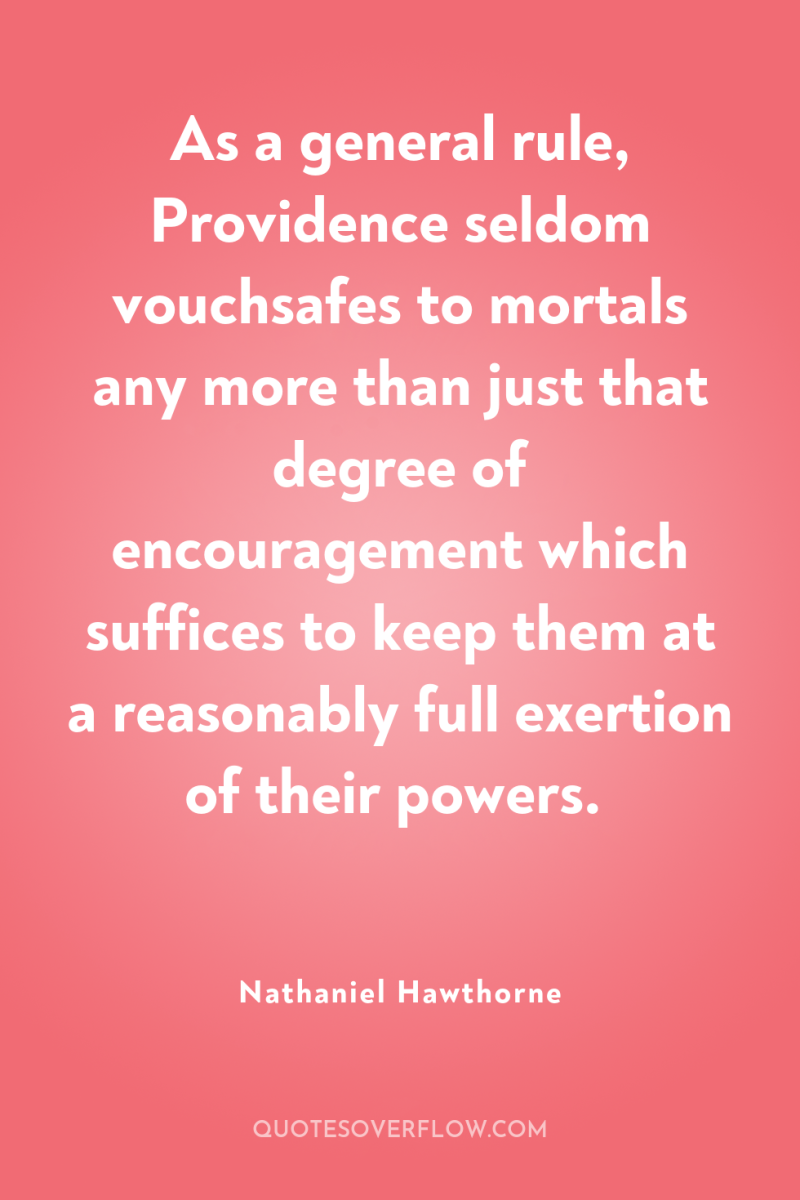
11
As a general rule, Providence seldom vouchsafes to mortals any more than just that degree of encouragement which suffices to keep them at a reasonably full exertion of their powers.Nathaniel Hawthorne

12
Easy reading is damn hard writing.Nathaniel Hawthorne
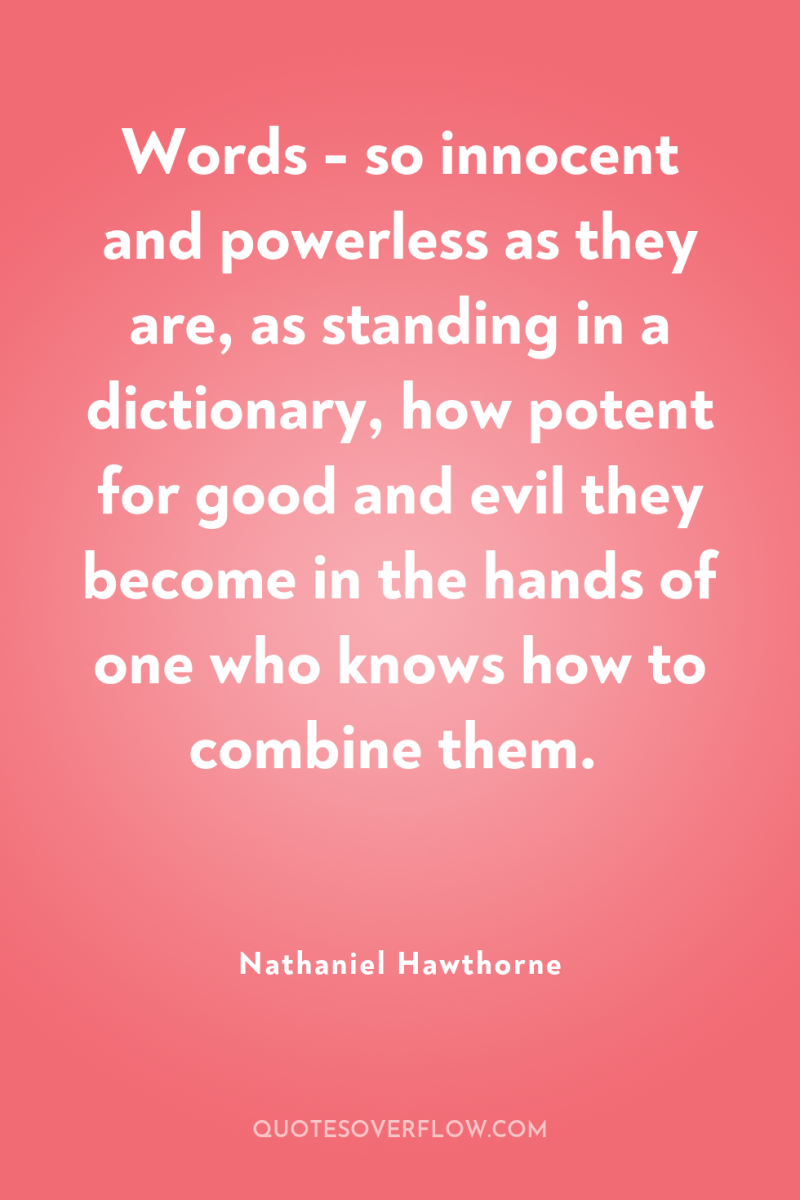
13
Words - so innocent and powerless as they are, as standing in a dictionary, how potent for good and evil they become in the hands of one who knows how to combine them.Nathaniel Hawthorne
14
Why are poets so apt to choose their mates, not for any similarity of poetic endowment, but for qualities which might make the happiness of the rudest handicraftsman as well as that of the ideal craftsman of the spirit? Because, probably, at his highest elevation, the poet needs no human intercourse; but he finds it dreary to descend, and be a stranger.Nathaniel Hawthorne
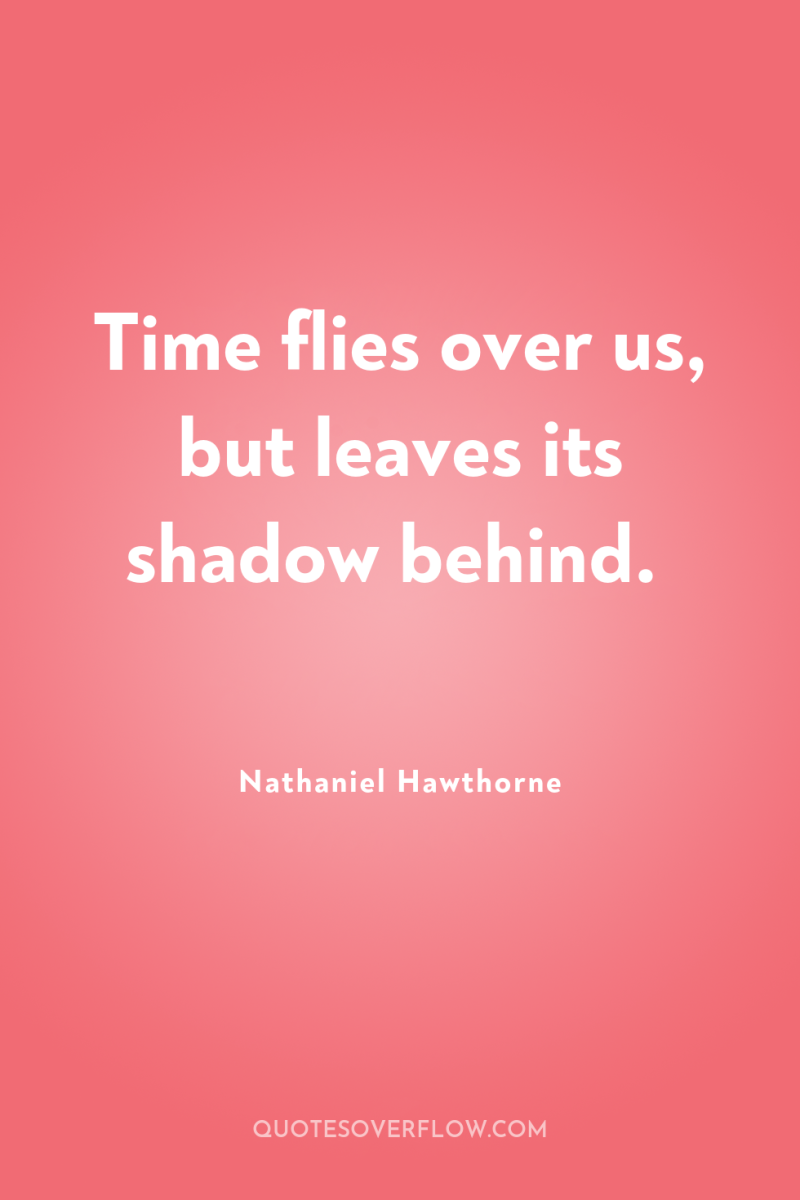
15
Time flies over us, but leaves its shadow behind.Nathaniel Hawthorne
16
The whole forest was peopled with frightful sounds--the creaking of the trees, the howling of wild beasts, and the yell of Indians; while sometimes the wind tolled like a distant church bell, and sometimes gave a broad roar around the traveler, as if all Nature were laughing him to scorn. But he was himself the chief horror of the scene, and shrank not from its other horrors.Nathaniel Hawthorne
17
Herman Melville came to see me at the Consulate, looking much as he used to do (a little paler, and perhaps a little sadder), in a rough outside coat, and with his characteristic gravity and reserve of manner.. [W]e soon found ourselves on pretty much our former terms of sociability and confidence. Melville has not been well, of late; .. and no doubt has suffered from too constant literary occupation, pursued without much success, latterly; and his writings, for a long while past, have indicated a morbid state of mind.. Melville, as he always does, began to reason of Providence and futurity, and of everything that lies beyond human ken, and informed me that he had "pretty much made up his mind to be annihilated"; but still he does not seem to rest in that anticipation; and, I think, will never rest until he gets hold of a definite belief. It is strange how he persists -- and has persisted ever since I knew him, and probably long before -- in wondering to-and-fro over these deserts, as dismal and monotonous as the sand hills amid which we were sitting. He can neither believe, nor be comfortable in his unbelief; and he is too honest and courageous not to try to do one or the other. If he were a religious man, he would be one of the most truly religious and reverential; he has a very high and noble nature, and better worth immortality than most of us.[after what would be their last meeting] .Nathaniel Hawthorne
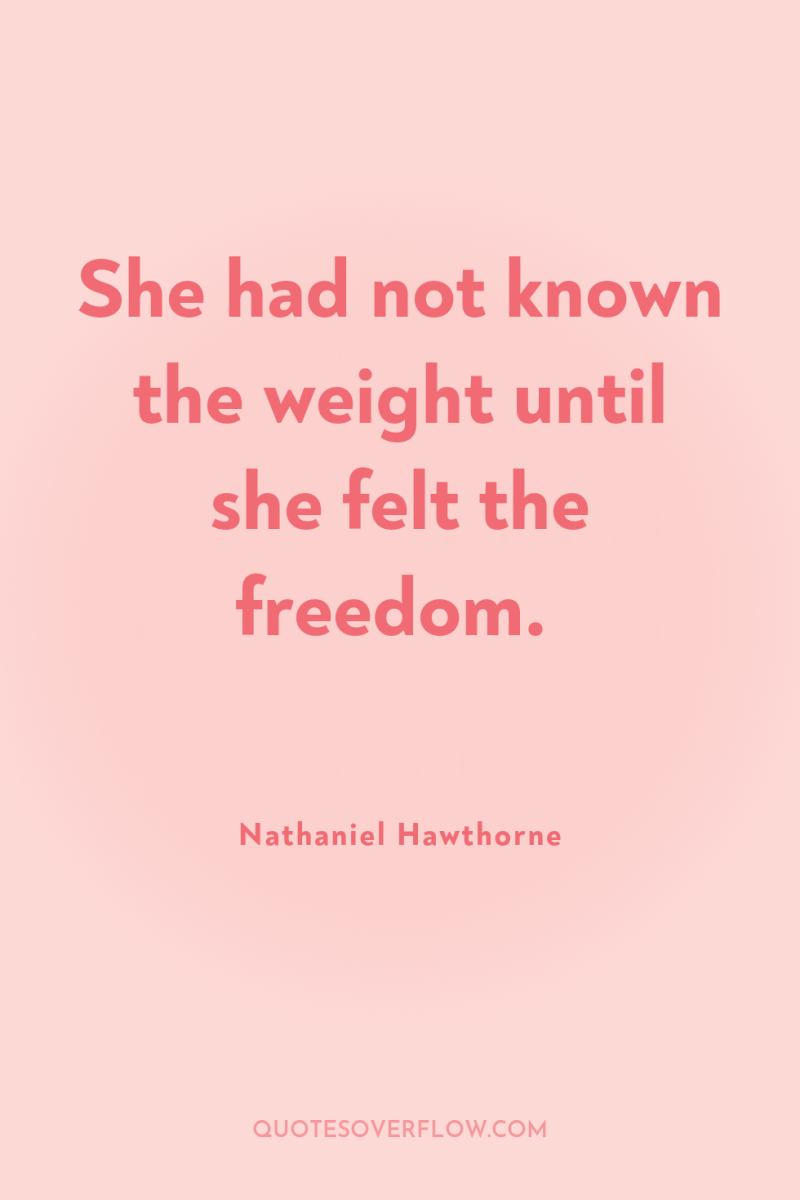
18
She had not known the weight until she felt the freedom.Nathaniel Hawthorne
19
The scarlet letter was her passport into regions where other women dared not tread.Nathaniel Hawthorne
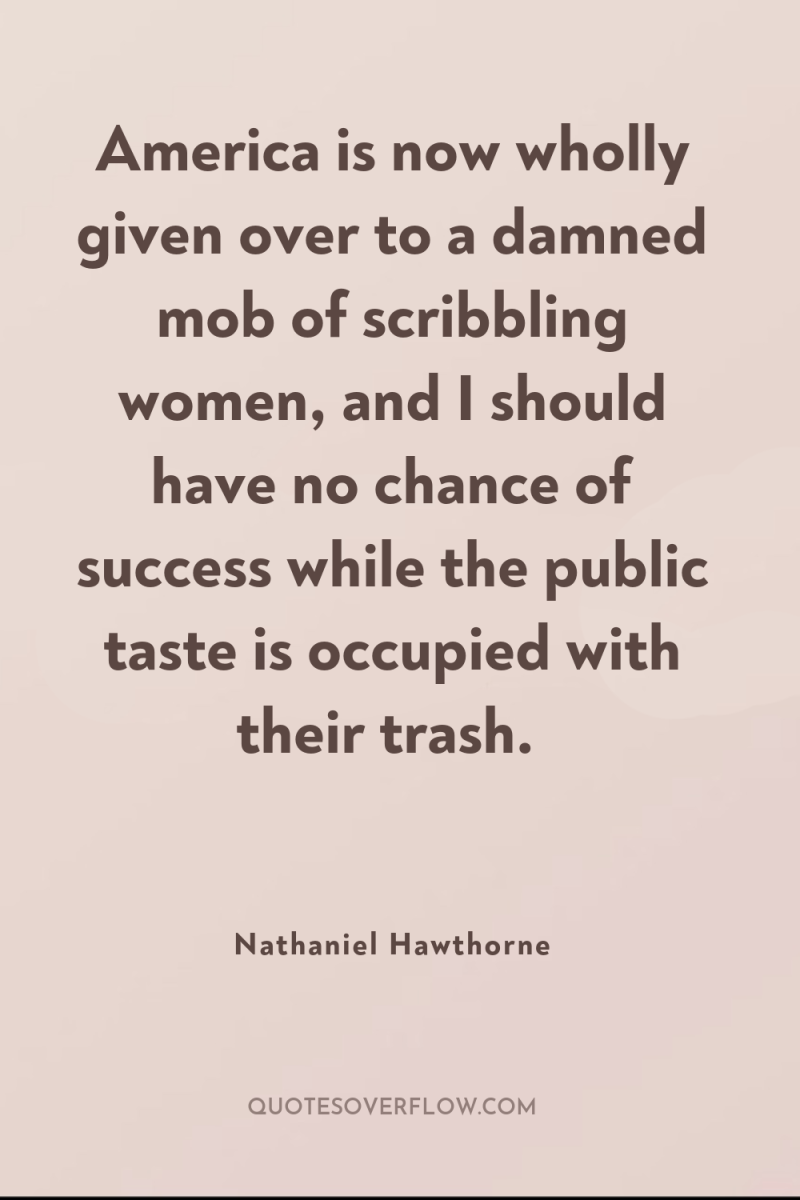
20
America is now wholly given over to a damned mob of scribbling women, and I should have no chance of success while the public taste is occupied with their trash.Nathaniel Hawthorne
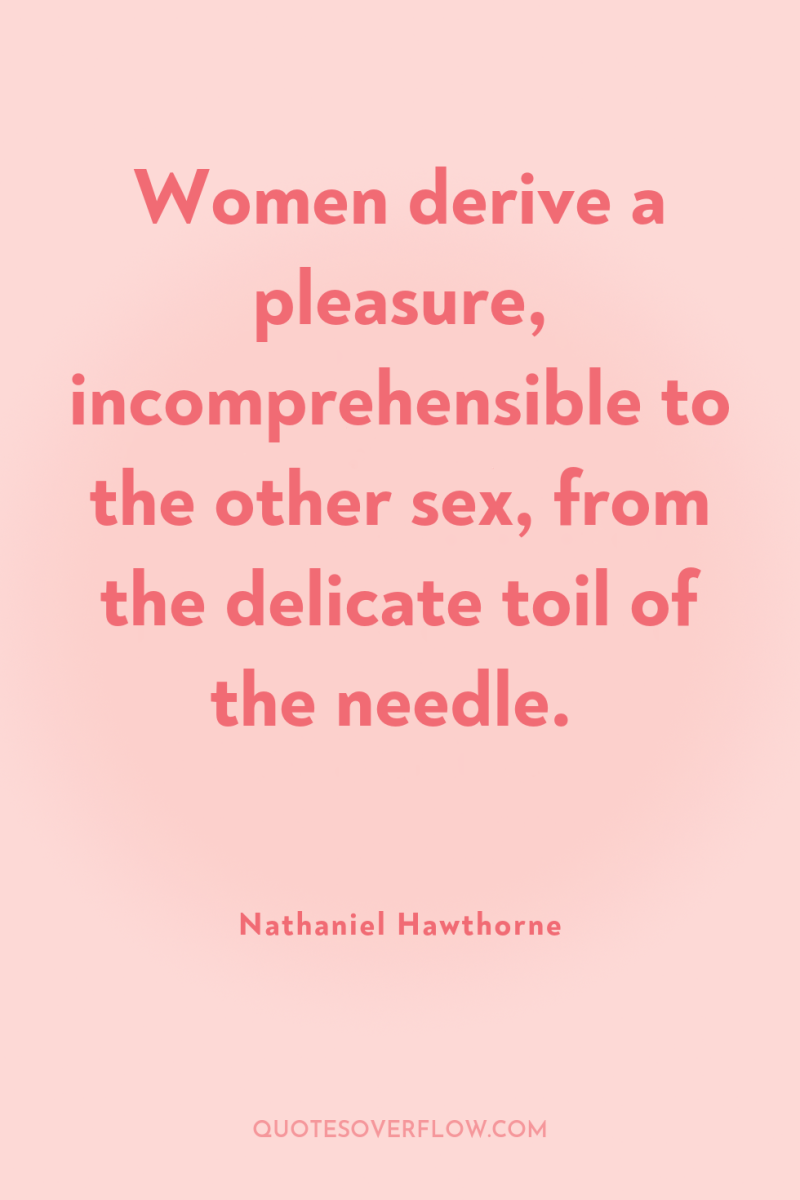
21
Women derive a pleasure, incomprehensible to the other sex, from the delicate toil of the needle.Nathaniel Hawthorne
22
America is now wholly given over to a damned mob of scribbling women, and I should have no chance of success while the public taste is occupied with their trash--and should be ashamed of myself if I did succeed. What is the mystery of these innumberable editions of The Lamplighter (by Maria Susanna Cummins), and other books neither better nor worse? Worse they could not be, and better they need not be, when they sell by the hundred thousand.Nathaniel Hawthorne
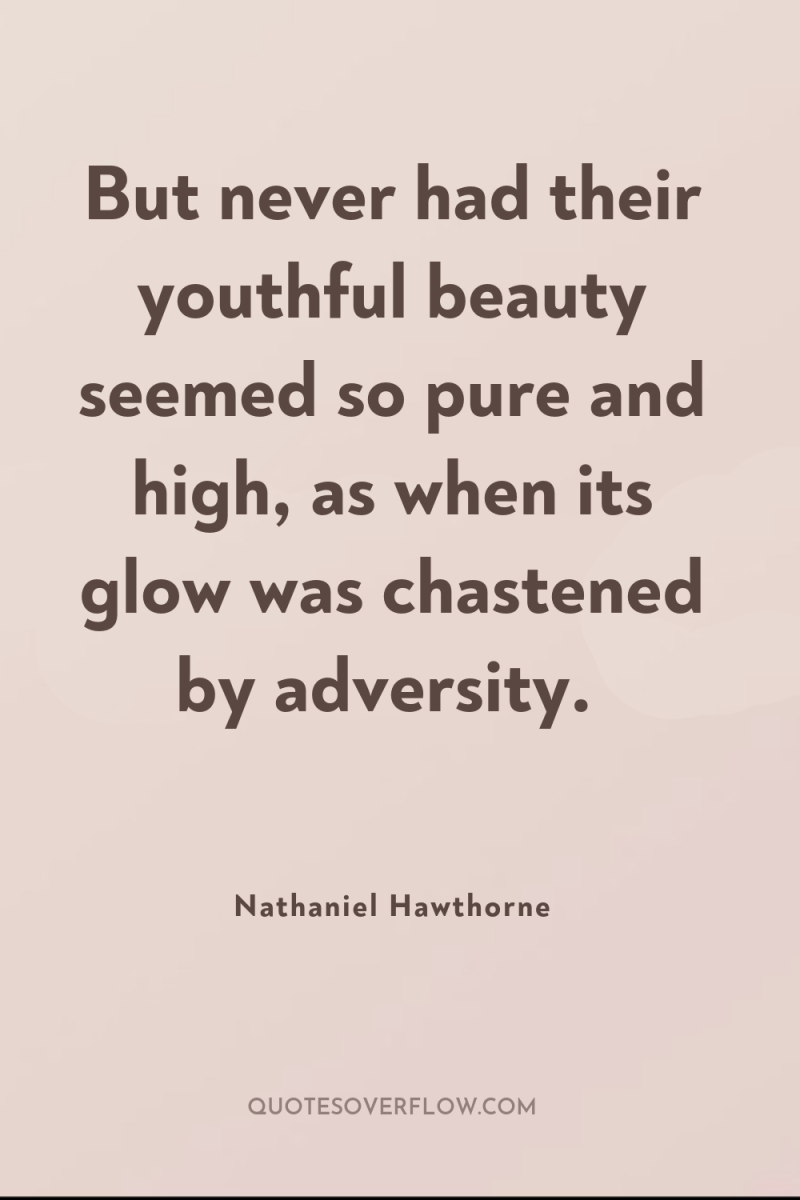
23
But never had their youthful beauty seemed so pure and high, as when its glow was chastened by adversity.Nathaniel Hawthorne
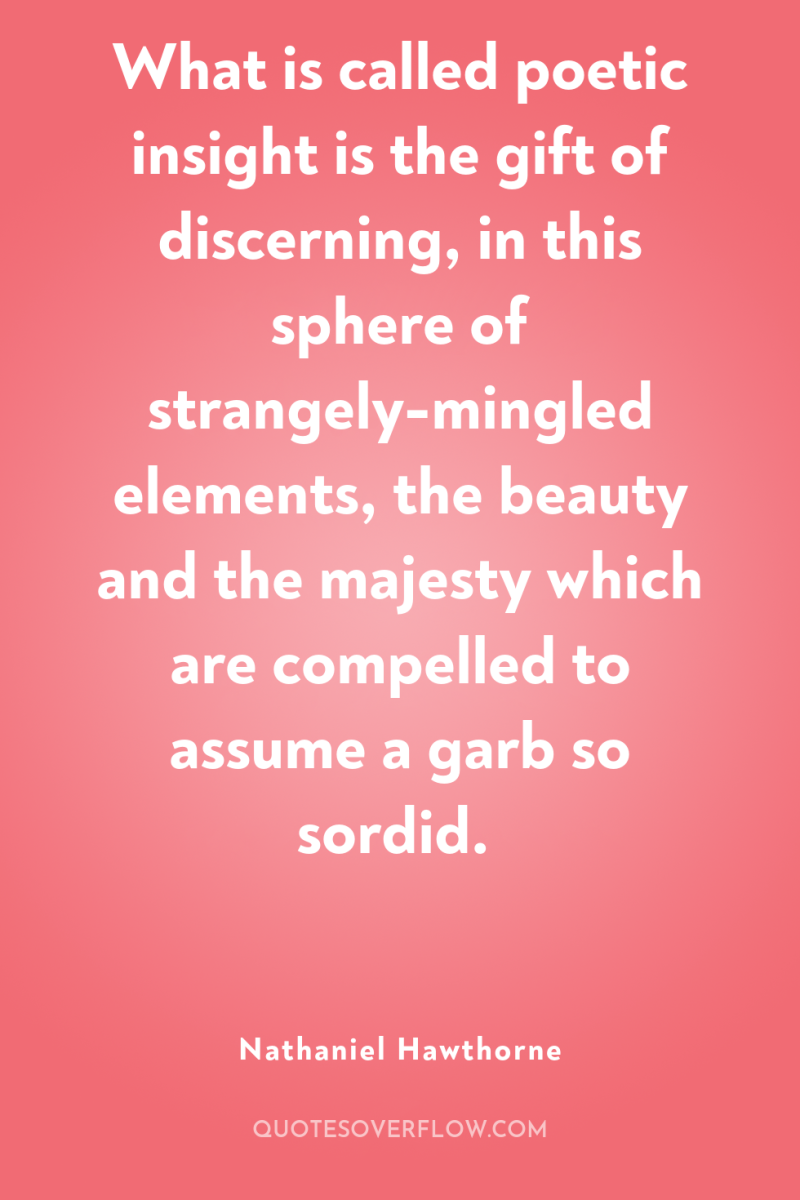
24
What is called poetic insight is the gift of discerning, in this sphere of strangely-mingled elements, the beauty and the majesty which are compelled to assume a garb so sordid.Nathaniel Hawthorne
25
He was not ill-fitted to be the head and representative of a community which owed its origin and progress, and its present state of development, not to the impulses of youth, but to the stern and tempered energies of manhood and the sombre sagacity of age; accomplishing so much, precisely because it imagined and hoped so little.Nathaniel Hawthorne
26
Every young sculptor seems to think that he must give the world some specimen of indecorous womanhood, and call it Eve, Venus, a Nymph, or any name that may apologize for a lack of decent clothing. I am weary, even more than I am ashamed, of seeing such things. Nowadays people are as good as born in their clothes, and there is practically not a nude human being in existence. An artist, therefore, as you must candidly confess, cannot sculpture nudity with a pure heart, if only because he is compelled to steal guilty glimpses at hired models. The marble inevitably loses its chastity under such circumstances. An old Greek sculptor, no doubt, found his models in the open sunshine, and among pure and princely maidens, and thus the nude statues of antiquity are as modest as violets, and sufficiently draped in their own beauty. But as for Mr. Gibson's colored Venuses (stained, I believe, with tobacco juice), and all other nudities of to-day, I really do not understand what they have to say to this generation, and would be glad to see as many heaps of quicklime in their stead.Nathaniel Hawthorne
27
Angels do not toil, but let their good works grow out of them.Nathaniel Hawthorne
28
I cannot endure to waste anything so precious as autumnal sunshine by staying in the hNathaniel Hawthorne
29
Some attribute had departed from her, the permanence of which had been essential to keep her a woman. Such is frequently the fate, and such the stern development, of the feminine character and person, when the woman has encountered, and lived through, an experience of peculiar severity. If she be all tenderness, she will die. If she survive, the tenderness will either be crushed out of her, or–and the outward semblance is the same–crushed so deeply into her heart that it can never show itself more. .Nathaniel Hawthorne
30
Let men tremble to win the hand of woman, unless they win along with it the utmost passion of her heart!Nathaniel Hawthorne
31
Like all other music, it breathed passion and pathos, and emotions high or tender, in a tongue native to the human heart, wherever educated.Nathaniel Hawthorne
32
It is a curious subject of observation and inquiry, whether hatred and love be not the same thing at bottom. Each, in its utmost development, supposes a high degree of intimacy and heart-knowledge; each renders one individual dependent for the food of his affections and spiritual life upon another; each leaves the passionate lover, or the no less passionate hater, forlorn and desolate by the withdrawal of his object.Nathaniel Hawthorne
33
The sorrow that lay cold in her mother's heart... converted it into a tomb.Nathaniel Hawthorne
34
The mind is in a sad state when Sleep, the all-involving, cannot confine her spectres within the dim region of her sway, but suffers them to break forth, affrighting this actual life with secrets that perchance belong to a deeper one.Nathaniel Hawthorne
35
He seemed to be in quest for mental food, not heart sustenance.Nathaniel Hawthorne
36
There are few uglier traits of human nature than this tendency–which I now witnessed in men no worse than their neighbours–to grow cruel, merely because they possessed the power of inflicting harm.Nathaniel Hawthorne
37
On Andrew Jackson: "His native strength compelled every man to be his tool that came within his reach; and the more cunning the individual might be, it served only to make him a sharper tool.Nathaniel Hawthorne
38
Do anything, save to lie down and die!Nathaniel Hawthorne
39
In the little chaos of Pearl's character there might be seen emerging-and could have been from the very first-the steadfast principles of an unflinching courage-an uncontrollable will-a sturdy pride which might be disciplined into self-respect-and a bitter scorn of many things, which, when examined, might be found to have the taint of falsehood in them.Nathaniel Hawthorne
40
There are many things in this world that a child must not ask about.Nathaniel Hawthorne
41
Would not the earth, quickened to an evil purpose by the sympathy of his eye, greet him with poisonous shrubs... Would he not suddenly sink into the earth, leaving a barren and blasted spot, where, in due course of time, would be seen deadly nightshade, dogwood, henbane, and whatever else of vegetable wickedness the climate could produce, all flourishing with hideous luxuriance?Nathaniel Hawthorne
42
In all her intercourse with society, however, there was nothing that made her feel as if she belonged to it... She stood apart from mortal interests, yet close beside them, like a ghost that revisits the familiar fireside, and can no longer make itself seen or felt.Nathaniel Hawthorne
43
Then might I exemplify how an influence beyond our control lays its strong hand on every deed which we do, and weaves its consequences into an iron tissue of necessity. (Wakefield)Nathaniel Hawthorne
44
All have some artificial badge which the world, and themselves among the first, learn to consider as a genuine characteristic.Nathaniel Hawthorne
45
Unable to penetrate to the secret place of his soul where his motives lay hidden, he believed that a supernatural voice had called him onward, and that a supernatural power had obstructed his retreat.Nathaniel Hawthorne
46
Is it a fact — or have I dreamt it — that, by means of electricity, the world of matter has become a great nerve, vibrating thousands of miles in a breathless point of time?Nathaniel Hawthorne
47
The sick in mind, and, perhaps, in body, are rendered more darkly and hopelessly so by the manifold reflection of their disease, mirrored back from all quarters in the deportment of those about them; they are compelled to inhale the poison of their own breath, in infinite repetition.Nathaniel Hawthorne
48
There was a listlessness in his gait, as if he saw no reason for taking one step further, nor felt any desire to do so, but would have been glad, could he be glad of anything, to fling himself down at the root of the nearest tree, and lie there passive for evermore. The leaves might bestrew him, and the soil gradually accumulate and form a little hillock over his frame, no matter whether there were life in it or no. Death was too definite an object to be wished for or avoided.Nathaniel Hawthorne
49
Possibly, he was in a state of second growth and recovery, and was constantly assimilating nutriment for his spirit and intellect from sights, sounds, and events which passed as a perfect void to persons more practised with the world. As all is activity and vicissitude to the new mind of a child, so might it be, likewise, to a mind that had undergone a kind of new creation, after its longsuspended life.Nathaniel Hawthorne
50
When he is cheerful--when the sun shines into his mind--then I venture to peep in, just as far as the light reaches, but no further. It is holy ground where the shadow falls!Nathaniel Hawthorne
51
Trusting no man as his friend, he could not recognize his enemy when the latter actually appeared.Nathaniel Hawthorne
52
It is not good for man to cherish a solitary ambition. Unless there be those around him, by whose example he may regulate himself, his thoughts, desires, and hopes will become extravagant, and he the semblance, perhaps the reality, of a madmanNathaniel Hawthorne
53
... for when a man's spirit has been thoroughly crushed, he may be peevish at small offenses, but never resentful of great ones.Nathaniel Hawthorne
54
Technologies of easy travel "give us wings; they annihilate the toil and dust of pilgrimage; they spiritualize travel! Transition being so facile, what can be any man’s inducement to tarry in one spot? Why, therefore, should he build a more cumbrous habitation than can readily be carried off with him? Why should he make himself a prisoner for life in brick, and stone, and old worm-eaten timber, when he may just as easily dwell, in one sense, nowhere, –in a better sense, wherever the fit and beautiful shall offer him a home? .Nathaniel Hawthorne
55
Strength is incomprehensible by weakness, and, therefore, the more terrible.Nathaniel Hawthorne
56
Pluck up a spirit, and do not be all the time sighing and murmuring!Nathaniel Hawthorne
57
It was no wonder that they thus questioned one another's actual and bodily existence, and even doubted of their own. So strangely did they meet in the dim wood that it was like the first encounter in the world beyond the grave of two spirits who had been intimately connected in their former life, but now stood coldly shuddering in mutual dread, as not yet familiar with their state, nor wonted to the companionship of disembodied beings. Each a ghost, and awe-stricken at the other ghost.Nathaniel Hawthorne
58
And as for Owen Warland, he looked placidly at what seemed the ruin of his life's labor, and which was yet no ruin. He had caught a far other butterfly than this. When the artist rose high enough to achieve the beautiful, the symbol by which he made it perceptible to mortal senses became of little value in his eyes while his spirit possessed itself in the enjoyment of the reality.Nathaniel Hawthorne
59
I have laughed, in bitterness and agony of heart, at the contrast between what I seem and what I am!Nathaniel Hawthorne
60
It was one of those moments–which sometimes occur only at the interval of years–when a man's moral aspect is faithfully revealed to his mind's eye. Not improbably, he had never before viewed himself as he did now.Nathaniel Hawthorne
61
That old woman taught me my catechism! " said the young man; and there was a world of meaning in this simple comment.Nathaniel Hawthorne
62
Shall we never never get rid of this Past? ... It lies upon the Present like a giant's dead body.Nathaniel Hawthorne
63
Oh, glorious Art! " thus mused the enthusiastic painter, as he trod the street. "Thou art the image of the Creator's own. The innumerable forms that wander in nothingness start into being at thy beck. The dead live again. Thou recallest them to their old scenes, and givest their gray shadows the lustre of a better life, at once earthly and immortal. Thou snatchest back the fleeing moments of History. With thee, there is no Past; for at thy touch, all that is great becomes forever present; and illustrious men live through long ages in the visible performance of the very deeds which made them what they are. .Nathaniel Hawthorne
64
An infinite, inscrutable blackness has annihilated sight! Where is our universe? All crumbled away from us; and we, adrift in chaos, may hearken to the gusts of homeless wind, that go sighing and murmuring about in quest of what was once a world!Nathaniel Hawthorne
65
Lo! there ye stand, my children, " said the figure, in a deep and solemn tone, almost sad, with its despairing awfulness, as if his once angelic nature could yet mourn for our miserable race. "Depending upon one another's hearts, ye had still hoped that virtue were not all a dream! Now are ye undeceived! Evil is the nature of mankind. Evil must be your only happiness.Nathaniel Hawthorne
66
Unfathomable to mere mortals is the lore of fiends.Nathaniel Hawthorne
67
Preach! Write! Act! Do any thing, save to lie down and die!Nathaniel Hawthorne
68
Cannot you conceive that another man may wish well to the world and struggle for its good on some other plan than precisely that which you have laid down?Nathaniel Hawthorne
69
She had wandered, without rule or guidance, into a moral wilderness.. Her intellect and heart had their home, as it were, in desert places, where she roamed as freely as the wild Indian in his woods.. The scarlet letter was her passport into regions where other women dared not tread. Shame, Despair, Solitude! These had been her teachers–stern and wild ones–and they had made her strong, but taught her much amiss. .Nathaniel Hawthorne
70
...Chillingworth was a striking evidence of man's faculty of transforming himself into a devil, if he will only, for a reasonable space of time, undertake a devil's office.Nathaniel Hawthorne
71
He had been driven hither by the impulse of that Remorse which dogged him everywhere, and whose own sister and closely linked companion was that Cowardice which invariably drew him back, with her tremulous gripe, just when the other impulse had hurried him to the verge of a disclosure.Nathaniel Hawthorne
72
To the untrue man, the whole universe is false--it is impalpable--it shrinks to nothing within his grasp.Nathaniel Hawthorne
73
Many people are seeking, at this very moment, to shelter themselves under the wing of the federal eagle; imagining, I presume, that her bosom has all the softness and snugness of an eider-down pillow. But she has no great tenderness, even in her best of moods, and, sooner or later, --oftener sooner than late, -- is apt to fling off her nestlings with a scratch of her claw, a dab of her beak, or a rankling wound from her barbed arrows.Nathaniel Hawthorne
74
A bachelor always feels himself defrauded, when he knows or suspects that any woman of his acquaintance has given herself away.Nathaniel Hawthorne
75
She has lived and loved! There is no folded petal, no latent dewdrop, in this perfectly developed rose!Nathaniel Hawthorne
76
Be it sin or no, I hate the man!Nathaniel Hawthorne
77
Had there been a Papist among the crowd of Puritans, he might have seen in this beautiful woman, so picturesque in her attire and mien, and with the infant at her bosom, an object to remind him of the image of Divine Maternity, which so many illustrious painters have vied with one another to represent; something which should remind him, indeed, but only by contrast, of that sacred image of sinless motherhood, whose infant was to redeem the world. Here, there was the taint of of deepest sin in the most sacred of quality of human life, working such effect, that the world was only the darker for this woman's beauty, and the more lost for the infant that she had borne.Nathaniel Hawthorne
78
...such loss of faith is ever one of the saddest results of sin.Nathaniel Hawthorne
79
O Fiend, whose talisman was that fatal symbol, wouldst thou leave nothing, whether in youth or age, for this poor sinner to revere?–such loss of faith is ever one of the saddest results of sin.Nathaniel Hawthorne
80
Man’s own youth is the world’s youth; at least, he feels as if it were, and imagines that the earth’s granite substance is something not yet hardened, and which he can mould into whatever shape he likes. So it was with Holgrave. He could talk sagely about the world’s old age, but never actually believed what he said; he was a young man still, and therefore looked upon the world–that graybearded and wrinkled profligate, decrepit, without being venerable–as a tender stripling, capable of being improved into all that it ought to be, but scarcely yet had shown the remotest promise of becoming. He had that sense, or inward prophecy, –which a young man had better never have been born than not to have, and a mature man had better die at once than utterly to relinquish, –that we are not doomed to creep on forever in the old bad way, but that, this very now, there are the harbingers abroad of a golden era, to be accomplished in his own lifetime. .Nathaniel Hawthorne
81
Our first youth is of no value; for we are never conscious of it, until after it is gone. But sometimes--always, I suspect, unless one is exceedingly unfortunate--there comes a sense of second youth, gushing out of the heart's joy at being in love; or possibly, it may come to crown some other grand festival in life, if any other such there be. This bemoaning of one's self. over the first, careless, shallow gayety of youth departed, and this profound happiness at youth regained, --so much deeper and richer than that we lost, --are essential to the soul's development. In some cases, the two states come almost simultaneously, and mingle the sadness and the rapture in one mysterious emotion.Nathaniel Hawthorne
82
I had ceased to be a writer of tolerably poor tales and essays, and had become a tolerably good Surveyor of the Customs. That was all. But, nevertheless, it is any thing but agreeable to be haunted by a suspicion that one's intellect is dwindling away; or exhaling, without your consciousness, like ether out of a phial; so that, at every glance, you find a smaller and less volatile residuum. Of the fact, there could be no doubt; and, examining myself and others, I was led to conclusions in reference to the effect of public office on the character, not very favorable to the mode of life in question. In some other form, perhaps, I may hereafter develop these effects. Suffice it here to say, that a Custom-House officer, of long continuance, can hardly be a very praiseworthy or respectable personage, for many reasons; one of them, the tenure by which he holds his situation, and another, the very nature of his business, which–though, I trust, an honest one–is of such a sort that he does not share in the united effort of mankind. An effect–which I believe to be observable, more or less, in every individual who has occupied the position–is, that, while he leans on the mighty arm of the Republic, his own proper strength departs from him. He loses, in an extent proportioned to the weakness or force of his original nature, the capability of self-support. If he possess an unusual share of native energy, or the enervating magic of place do not operate too long upon him, his forfeited powers may be redeemable. The ejected officer–fortunate in the unkindly shove that sends him forth betimes, to struggle amid a struggling world–may return to himself, and become all that he has ever been. But this seldom happens. He usually keeps his ground just long enough for his own ruin, and is then thrust out, with sinews all unstrung, to totter along the difficult footpath of life as he best may. Conscious of his own infirmity, –that his tempered steel and elasticity are lost, –he for ever afterwards looks wistfully about him in quest of support external to himself. His pervading and continual hope–a hallucination, which, in the face of all discouragement, and making light of impossibilities, haunts him while he lives, and, I fancy, like the convulsive throes of the cholera, torments him for a brief space after death–is, that, finally, and in no long time, by some happy coincidence of circumstances, he shall be restored to office. This faith, more than any thing else, steals the pith and availability out of whatever enterprise he may dream of undertaking. Why should he toil and moil, and be at so much trouble to pick himself up out of the mud, when, in a little while hence, the strong arm of his Uncle will raise and support him? Why should he work for his living here, or go to dig gold in California, when he is so soon to be made happy, at monthly intervals, with a little pile of glittering coin out of his Uncle's pocket? It is sadly curious to observe how slight a taste of office suffices to infect a poor fellow with this singular disease. Uncle Sam's gold–meaning no disrespect to the worthy old gentleman–has, in this respect, a quality of enchantment like that of the Devil's wages. Whoever touches it should look well to himself, or he may find the bargain to go hard against him, involving, if not his soul, yet many of its better attributes; its sturdy force, its courage and constancy, its truth, its self-reliance, and all that gives the emphasis to manly character.Nathaniel Hawthorne
83
Calm, gentle, passionless as he appeared, there was yet, we fear, a quiet depth of malice, hitherto latent, but active now, in this unfortunate old man, which led him to imagine a more intimate revenge than any mortal had ever wreaked upon an enemy.Nathaniel Hawthorne
84
In either case, there was very much the same solemnity of demeanour on the part of the spectators, as befitted a people among whom religion and law were almost identical, and in whose character both were so thoroughly interfused, that the mildest and severest acts of public discipline were alike made venerable and awful.Nathaniel Hawthorne
85
All brave men love; for he only is brave who has affections to fight for, whether in the daily battle of life, or in physical contests.Nathaniel Hawthorne
86
Possibly, some cynic, at once merry and bitter, had desired to signify, in this pantomimic scene, that we mortals, whatever our business or amusement--however serious, however trifling--all dance to one identical tune, and, in spite of our ridiculous activity, bring nothing finally to pass.Nathaniel Hawthorne
87
That Jim Crow there in the window, " answered the urchin, holding out a cent, and pointing to the gingerbread figure that had attracted his notice, as he loitered along to school; "the one that has not a broken foot.Nathaniel Hawthorne
88
I have come to see the nonsense of trying to describe fine scenery.Nathaniel Hawthorne
89
It is a curious subject of observation and inquiry, whether hatred and love be not the same thing at bottom. Each, in its utmost development, supposes a high degree of intimacy and heart-knowledge; each renders one individual dependent for the food of his affections and spiritual fife upon another: each leaves the passionate lover, or the no less passionate hater, forlorn and desolate by the withdrawal of his subject. Philosophically considered, therefore, the two passions seem essentially the same, except that one happens to be seen in a celestial radiance, and the other in a dusky and lurid glow.Nathaniel Hawthorne
90
Nothing gives a sadder sense of decay than this loss or suspension of the power to deal with unaccustomed things, and to keep up with the swiftness of the passing moment. [Speaking of self-posed isolation in old age.]Nathaniel Hawthorne
91
The truth seems to be, however, that, when he casts his leaves forth upon the wind, the author addresses, not the many who will fling aside his volume, or never take it up, but the few who will understand him, better than most of his schoolmates and lifemates. Some authors, indeed, do far more than this, and indulge themselves in such confidential depths of revelation as could fittingly be addressed, only and exclusively, to the one heart and mind of perfect sympathy; as if the printed book, thrown at large on the wide world, were certain to find out the divided segment of the writer's own nature, and complete his circle of existence by bringing him into communion with it.Nathaniel Hawthorne
92
But year after year that summons, unheard but felt, was disobeyed. His one secret thought became like a chain binding down his spirit and like a serpent gnawing into his heart.Nathaniel Hawthorne
93
It is the unspeakable misery of a life so false as his, that it steals the pith and substance out of whatever realities there are around us, and which were meant by Heaven to be the spirit’s joy and nutriment. To the untrue man, the whole universe is false–it is impalpable–it shrinks to nothing within his grasp. And he himself in so far as he shows himself in a false light, becomes a shadow, or, indeed, ceases to exist.Nathaniel Hawthorne
94
What's that you mutter to yourself, Matthew Maule?" asked Scicpio. "And what for do you look so black at me?"" No matter, darky, " said the carpenter. "Do you think nobody is to look black but yourself?Nathaniel Hawthorne
95
The horrible ugliness of this exposure of a sick and guilty heart to the very eye that would gloat over it!Nathaniel Hawthorne
96
And Pearl, stepping in, mid-leg deep, beheld her own white feet at the bottom, while out of a still lower depth came the gleam of a kind of fragmentary smile, floating to and fro in the agitated water.Nathaniel Hawthorne
97
Jim Crow, moreover, was seen executing his world-renowned dance, in gingerbread.Nathaniel Hawthorne
98
That Archangel, now, " Miriam continued; "how fair he looks, with his unruffled wings, with his unhacked sword, and clad in his bright armor, and that exquisitely fitting sky-blue tunic, cut in the latest Paradisiacal mode! What a dainty air of the first celestial society! With what half-scornful delicacy he sets his prettily sandaled foot on the head of his prostrate foe! But, is it thus that virtue looks the moment after its death struggle with evil? No, no; I could have told Guido better. A full third of the Archangel's feathers should have been torn from his wings; the rest all ruffled, till they looked like Satan's own! His sword should be streaming with blood, and perhaps broken half-way to the hilt; his armor crushed, his robes rent, his breast gory; a bleeding gash on his brow, cutting right across the stern scowl of battle! He should press his foot down upon the old serpent, as if his very soul depended upon it, feeling him squirm mightily, and doubting whether the fight were half over yet, and how the victory might turn! And, with all this fierceness, this grimness, this unutterable horror, there should be something high, tender, and holy in Michael's eyes, and around his mouth.Nathaniel Hawthorne
99
A hero cannot be a hero unless in a heroic world.Nathaniel Hawthorne
100
Might and wrong combined, like iron magnetized, are endowed with irresistible attraction.Nathaniel Hawthorne